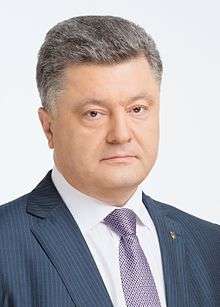Ukrainian oligarchs
The Ukrainian oligarchs are a group of business oligarchs that quickly appeared on the economic and political scene of Ukraine after its independence in 1991, just as happened in neighboring post-Soviet state Russia.[1][2] In 2008, the combined wealth of Ukraine's 50 richest oligarchs was equal to 85% of Ukraine's GDP.[3] In November 2013 this number was 45% (of GDP).[4] By 2015, due to the Ukrainian crisis, the total net worth of the five richest and most influential Ukrainians (Rinat Akhmetov, Viktor Pinchuk, Ihor Kolomoyskyi, Henadiy Boholyubov and Yuriy Kosiuk) had dropped from $21.6 billion in 2014 to $11.85 billion in June 2015.[5] (In 2014 Ukrainian GDP fell by 7%; in 2015 it shrunk 12%.[6])
Usage
Oligarchs are usually defined as businessmen having direct influence on both politics and economy. During the 1990s, the oligarchs emerged as well-connected entrepreneurs who started from nearly nothing and got rich through participation in the market via connections to the corrupt, but democratically elected government of Ukraine during the state's transition to a market-based economy. Later numerous Ukrainian businesspeople have "taken over control" of political parties (examples of this are Party of Greens of Ukraine, Labour Ukraine and Social Democratic Party of Ukraine (united)[1]) or started new ones to gain seats and influence in the Verkhovna Rada (Ukrainian parliament).
The rise of the oligarchs has been connected to the processes of privatization of state-owned assets. These processes usually involved the distribution of property titles of such enterprises, land, and real estate, on equal base to the whole population of the country, through instruments such as privatization vouchers, certificates, and coupons. Given the different preferences of people in relation to risk-aversity, property titles were easily re-sold. Businessmen who could provide an initial investment capital to collect such property titles could thus easily arrive to the property of whole former public holdings.
The oligarchs' influence on the Ukrainian Government is uncertain.[5] In 2011 some analysts and Ukrainian politicians believed that some Ukrainian businesses tycoons, with "lucrative relations" with Russia, were deliberately hindering Ukraine's European Union integration.[7]
Notable Ukrainian oligarchs
In January 2001 only two people of this list were seen as being an oligarch by the general public (Lazarenko and Tymoshenko, topping a Kyiv International Institute of Sociology survey in January 2001).[8]
- Rinat Akhmetov is the wealthiest man in Ukraine.
- Petro Poroshenko, the fifth and current President of Ukraine.
- Viktor Yanukovych, the fourth President of Ukraine
- Leonid Chernovetskyi, one of the first bankers in Ukraine, former mayor of the capital Kyiv.
- Dmytro Firtash, the most important figure in the vital gas industry.
- Andriy Klyuyev, a multi-millionaire with a long career in Ukrainian government with rapidly growing fortune and alleged close connection to the President's family.
- Ihor Kolomoyskyi, the second/third richest person in Ukraine since at least 2006.[9]
- Viktor Pinchuk, the son-in-law of ex-president Leonid Kuchma who controls much of the nation's media.
- Yulia Tymoshenko, former Prime Minister of Ukraine, speculated to be one of the wealthiest persons in Ukraine (although she claims to have a modest income).[10][11][12][13]
- Serhiy Tihipko, a multi-millionaire with a long career in Ukrainian politics.[14]
- Pavlo Lazarenko, former Prime Minister of Ukraine now jailed in U.S. prison.
- Vadim Rabinovich
- Oleksandr Yaroslavskiy
- Maksim Deloovan
- David Zhvaniya
- Armenak Minasyants
- Hennadiy Korban[15]
See also
- Russian oligarchs
- Business magnate
- History of post-Soviet Russia#Rise of the oligarchs
- Oligarchy
- Robber baron (industrialist)
References
- 1 2 Virtual Politics - Faking Democracy in the Post-Soviet World, Andrew Wilson, Yale University Press, 2005, ISBN 0-300-09545-7
- ↑ Ukraine's New Rulers: What Do They Want?, Radio Free Europe/Radio Liberty (June 03, 2010)
- ↑ Kuzio, Taras (1 July 2008). "OLIGARCHS WIELD POWER IN UKRAINIAN POLITICS". Eurasia Daily Monitor. 5 (125).
- ↑ http://www.ecfr.eu/page/-/ECFR_160_SURVIVAL_OF_THE_RICHEST-_HOW_OLIGARC1_BLOCK_REFORM_IN_UKRAINE.pdf
- 1 2 "A Decisive Turn? Risks for Ukrainian Democracy After the Euromaidan". Carnegie Endowment for International Peace. February 3, 2016.
- ↑ https://www.economist.com/blogs/freeexchange/2016/01/lviv-not-donetsk
- ↑ EU Hopes Fade As Gas Lobby Triumphs, Kyiv Post (16 December 2011)
- ↑ Democratic Revolution in Ukraine: From Kuchmagate to Orange Revolution by Taras Kuzio, Routledge, 2009, ISBN 0415441412 (chapter 4)
- ↑ "President v oligarch". The Economist. 28 March 2015. Retrieved 28 March 2015.
- ↑ The millionaire revolutionary, The Guardian (November 26, 2004)
- ↑ While leading lavish lifestyles, politicians declare almost pauper-like incomes, assets, Kyiv Post (June 17, 2010)
- ↑ (in Ukrainian) Тимошенко і "Віттон" – Люксембурзький "мове тон", ТаблоID (June 17, 2009)
- ↑ (in Ukrainian) Юлія Тимошенко і Катерина Ющенко вдарили по Chanel, ТаблоID (November 19, 2008)
- ↑ Tihipko gains strength as decisive day arrives, Kyiv Post (January 14, 2010)
- ↑ Top-100 the richest Ukrainians 2013 - Gennadiy Korban, site of the Forbes-Ukraine magazine, October, 15, 2013
Ukrop party will run in local elections across Ukraine, Kyiv Post (July 27, 2015)
External links
- Chernovetsky enters Wprost list of 100 richest people by Kyiv Post (October 22, 2008)
- To Catch an Oligarch by Jasen Felch and Justin Kane, Center for Investigative Reporting (October 4, 2004)




